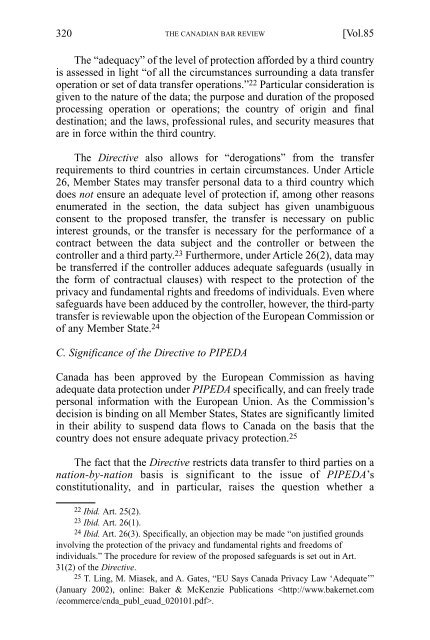PIPEDA: A CONSTITUTIONAL ANALYSIS - Goodmans
PIPEDA: A CONSTITUTIONAL ANALYSIS - Goodmans
PIPEDA: A CONSTITUTIONAL ANALYSIS - Goodmans
You also want an ePaper? Increase the reach of your titles
YUMPU automatically turns print PDFs into web optimized ePapers that Google loves.
320 THE CANADIAN BAR REVIEW<br />
[Vol.85<br />
The “adequacy” of the level of protection afforded by a third country<br />
is assessed in light “of all the circumstances surrounding a data transfer<br />
operation or set of data transfer operations.” 22 Particular consideration is<br />
given to the nature of the data; the purpose and duration of the proposed<br />
processing operation or operations; the country of origin and final<br />
destination; and the laws, professional rules, and security measures that<br />
are in force within the third country.<br />
The Directive also allows for “derogations” from the transfer<br />
requirements to third countries in certain circumstances. Under Article<br />
26, Member States may transfer personal data to a third country which<br />
does not ensure an adequate level of protection if, among other reasons<br />
enumerated in the section, the data subject has given unambiguous<br />
consent to the proposed transfer, the transfer is necessary on public<br />
interest grounds, or the transfer is necessary for the performance of a<br />
contract between the data subject and the controller or between the<br />
controller and a third party. 23 Furthermore, under Article 26(2), data may<br />
be transferred if the controller adduces adequate safeguards (usually in<br />
the form of contractual clauses) with respect to the protection of the<br />
privacy and fundamental rights and freedoms of individuals. Even where<br />
safeguards have been adduced by the controller, however, the third-party<br />
transfer is reviewable upon the objection of the European Commission or<br />
of any Member State. 24<br />
C. Significance of the Directive to <strong>PIPEDA</strong><br />
Canada has been approved by the European Commission as having<br />
adequate data protection under <strong>PIPEDA</strong> specifically, and can freely trade<br />
personal information with the European Union. As the Commission’s<br />
decision is binding on all Member States, States are significantly limited<br />
in their ability to suspend data flows to Canada on the basis that the<br />
country does not ensure adequate privacy protection. 25<br />
The fact that the Directive restricts data transfer to third parties on a<br />
nation-by-nation basis is significant to the issue of <strong>PIPEDA</strong>’s<br />
constitutionality, and in particular, raises the question whether a<br />
22 Ibid. Art. 25(2).<br />
23 Ibid. Art. 26(1).<br />
24 Ibid. Art. 26(3). Specifically, an objection may be made “on justified grounds<br />
involving the protection of the privacy and fundamental rights and freedoms of<br />
individuals.” The procedure for review of the proposed safeguards is set out in Art.<br />
31(2) of the Directive.<br />
25 T. Ling, M. Miasek, and A. Gates, “EU Says Canada Privacy Law ‘Adequate’”<br />
(January 2002), online: Baker & McKenzie Publications .
















